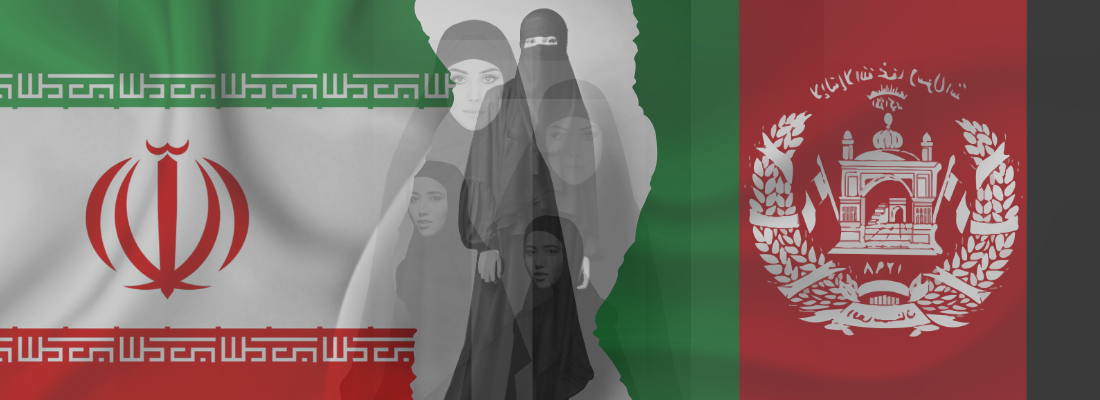Afghanistan and Iran put under the microscope in new Gender Apartheid Inquiry
Wednesday 31 January 2024

The International Bar Association’s Human Rights Institute (IBAHRI) has convened the Gender Apartheid Inquiry – a new British Parliamentary ad-hoc inquiry into whether the systematic oppression of women and girls in Afghanistan and Iran constitutes gender apartheid.
Apartheid is a crime under international law that was designed around, and applies only to, the issue of racial segregation not gender. However, when the situation of women in Afghanistan and Iran is considered, it is clear there are parallels in the way in which women in these countries are segregated and removed from society. This is why Afghan and Iranian women lawyers, politicians, scholars and human rights defenders, together with international activists and experts, have been calling for the recognition of the situation of women and girls in the two countries as gender apartheid. The treatment of women in these jurisdictions involves a similar subjugation and segregation observed during South Africa’s apartheid era.
Richard Goldstone, retired Justice of the Constitutional Court of South Africa, commented: ‘In South Africa the systematic application of discrimination was applied against the majority of its people – on the basis of race. This was the crime of apartheid. So, too, in Afghanistan and Iran, there is systematic discrimination applied against all the women and girls in those countries. It is thus appropriate to pursue the international recognition of the crime of gender apartheid and to seek appropriate amendments of international legal instruments to achieve this end.’
In Iran, women are banned from pursuing certain fields of study, attending sporting events, obtaining a passport and traveling outside the country without their husband's permission, among other things.
In Afghanistan, women are essentially shut out of public life and society; they are prohibited from travelling without a male escort, receiving an education, working outside in most sectors and accessing public baths, parks and gyms.
Over the last year, the issue of excluding women from public life in Afghanistan and Iran has been receiving increased attention, including from United Nations experts. Richard Bennett, the UN Special Rapporteur on the situation of human rights in Afghanistan stated, ‘[s]ystematic discrimination, oppression and segregation of women and girls require further examination of the evolving phenomenon of “gender apartheid”’. Similarly, the UN Special Rapporteur on the situation of human rights in the Islamic Republic of Iran, Javaid Rehman, said, ‘Iranian women and girls are subjected to gender-based apartheid, targeting and discrimination […] having been excluded from all platforms for democratic dialogue or reform’.
Baroness Helena Kennedy KC, IBAHRI Director, stated: ‘Following the news regarding the systemic and most extreme form of gender-based discrimination that women and girls face both under the Mullahs’ regime in Iran and the Taliban regime in Afghanistan, the IBAHRI is highly concerned that the existence of women and girls is being erased outside of their homes. The restrictions on movement, and the denial of education, participation in public life, in political life, in social life and in the economy of women and girls solely based on their gender cannot be accepted. Thus, it should be assessed how those illegal actions of the two regimes fit into the concept of gender apartheid and how gender apartheid fits within the existing legal crimes.’
The Inquiry consists of five stages.
- First: a short mapping exercise identifying the evidence in relation to the situation of women and girls in Afghanistan and Iran and identifying the gaps in the evidence was undertaken.
- Second: conduct an open call for submissions relating to evidence, facts on the ground and the application of relevant law.
- Third: arrange oral hearings with experts and witnesses. The Inquiry has conducted five oral hearings so far. Experts were given the opportunity to testify before a panel consisting of high-profile Parliamentarians including Baroness Kennedy of the Shaws KC, Baroness Hodgson, Joanna Cherry MP, Caroline Nokes MP, and Lisa Nandy MP, among others. Also, the panel had an opportunity to converse with a number of representatives from the Committee on the Elimination of Discrimination Against Women (CEDAW).
- Fourth: publication of a report containing the findings and recommendations.
- Fifth: engage domestic and international bodies with the findings and recommendations throughout the Inquiry and upon completion of the Inquiry.
The main objective of the Gender Apartheid Inquiry is to identify practical and meaningful steps that can be taken to address the situation of women and girls in Afghanistan and Iran, as a matter of urgent international concern and within the context of gender apartheid.
ENDS
Contact: IBAHRI@int-bar.org
Notes to the Editor
- Related material:
-
The International Bar Association’s Human Rights Institute (IBAHRI), established in 1995 under Founding Honorary President Nelson Mandela, is an autonomous and financially independent entity, working to promote, protect and enforce human rights under a just rule of law, and to preserve the independence of the judiciary and the legal profession worldwide.
- Find the IBAHRI (@IBAHRI) on social media here:
-
The International Bar Association (IBA), the global voice of the legal profession, is the foremost organisation for international legal practitioners, bar associations and law societies. Established in 1947, shortly after the creation of the United Nations, it was born out of the conviction that an organisation made up of the world's bar associations could contribute to global stability and peace through the administration of justice.
- Find the IBA (@IBAnews) on social media here:
Website page link for this news release:
Short link: www.tinyurl.com/ybuf4bkz4
Full link: www.ibanet.org/Afghanistan-and-Iran-put-under-the-microscope-in-new-Gender-Apartheid-Inquiry
